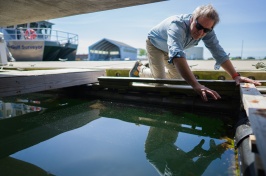College of Life Sciences & Agriculture
Phytoplankton Monitoring in Gulf of Maine as a Signal of Climate Change Impacts
UNH researchers study phytoplankton dynamics in the Gulf of Maine to understand climate change impacts, marine biodiversity shifts, and sustainable ecosystem management. Read More-
12/06/24
COLSA Faculty Spotlight: David Plachetzki
Explore how Associate Professor David Plachetzki combines genetics, computational biology, and SCUBA fieldwork to uncover the origins of animal... -
12/04/24
How Migratory Marine Life Connects Ecosystems from New England to Florida
Discover how UNH researchers use acoustic telemetry to track migratory patterns of marine species, revealing insights for sustainable fisheries and... -
11/25/24
Could Microplastics Be a Problem for New Hampshire's Estuaries?
At the University of New Hampshire, Bonnie Brown, professor of ecological genetics, and Gregg Moore, associate professor of coastal restoration and... -
11/20/24
Rising Above Traditional Crop Disease Scouting
Discover how UNH researchers are using drones to detect crop diseases early, offering affordable solutions to support New England's small and mid-...
Recent Stories
-
07/15/24 - Using Duckweed as a Green ManureDiscover UNH research on using duckweed to cleanse water and serve as green manure for sustainable farming. Read More
-
07/12/24 - Grandy Named Fellow of Soil Science Society of AmericaStuart Grandy, professor of soil biogeochemistry and fertility and co-director of the UNH Center of Soil Biogeochemistry and Microbial Ecology (Soil BioME), was recently named a... Read More
-
07/09/24 - Sustainable Shrimp Farming: Reducing Nitrogen Using Seaweed and OystersDiscover how UNH researchers use integrated multi-trophic aquaculture (IMTA) with seaweed and oysters to reduce nitrogen pollution in sustainable shrimp farming. Read More
-
07/08/24 - New Agroforestry Project Studies Integration of Farming and ForestsUNH leads a new USDA-funded agroforestry project that studies integrating crop and animal farming in forested areas for enhanced food production, carbon sequestration and climate... Read More
-
07/02/24 - Targeted Home Systems to Remove PFAS More Cost-Effective Than System-Wide SolutionsHouseholds on public water systems are willing to pay an average of $13.07 a month, or $156.84 annually, on their monthly bills to protect themselves from PFAS — potentially... Read More
-
06/26/24 - UNH Receives USDA Grant to Boost Climate-Resilient Farming PracticesUNH receives USDA grant to explore crop row orientation and cover cropping strategies, aiming to boost climate-resilient farming practices and enhance soil health. Read More
-
06/19/24 - Microplastics in EstuariesEstuaries in New England are crucial for wildlife and aquaculture, but microplastics pose a growing threat. UNH researchers are studying microplastic movement and accumulation to... Read More
-
06/17/24 - Aquatic Plants Could Help Reduce Water PollutionTiny aquatic plants called duckweed and their microbes could be engineered to cleanse chemicals from runoff water. Anna O'Brien's research at UNH aims to improve stormwater... Read More
-
06/13/24 - COLSA Faculty Spotlight: Bonnie BrownDiscover why COLSA Professor Bonnie Brown chose New Hampshire, how Richard Dreyfuss inspired her career, and the five must-have items in her fridge. Read More
-
06/11/24 - Petit ’26 Earns NOAA Hollings ScholarshipWorking as a research assistant during the spring semester in the lab of Michael Chambers, research associate professor in UNH’s Center for Sustainable Seafood Systems, Elisabeth... Read More































































